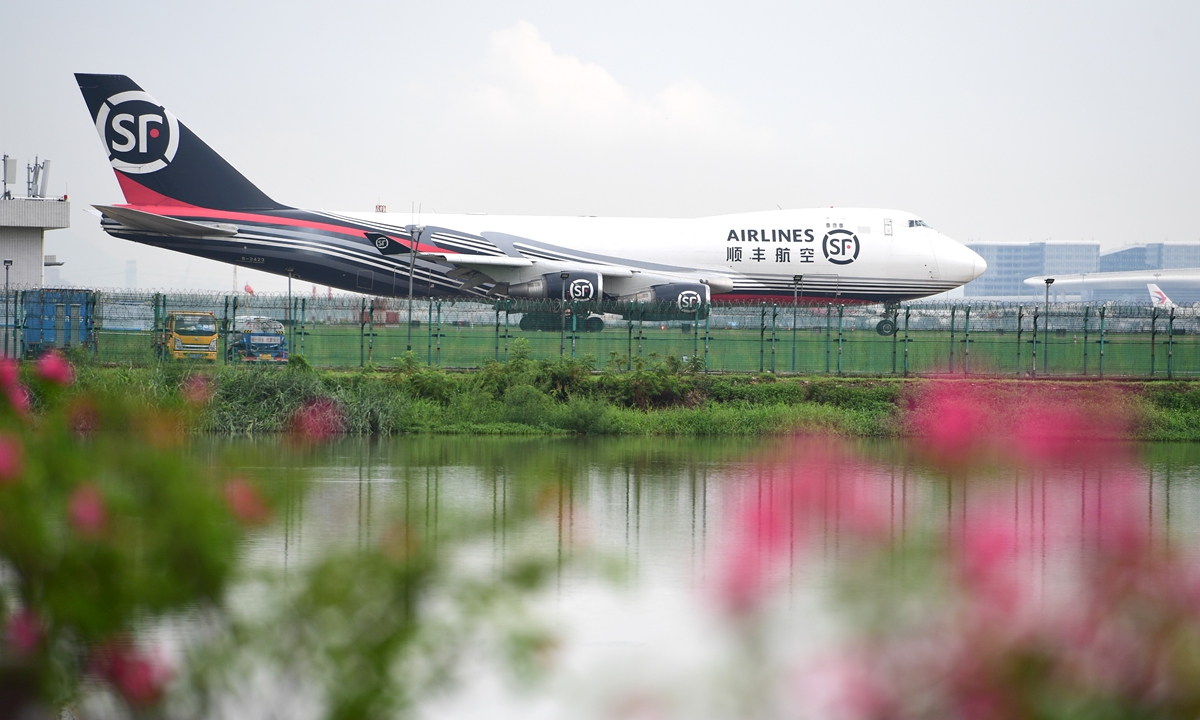The battle for vaccine transportation and distribution begins
By Tu Lei Source: Global Times Published: 2020/11/19 17:38:40

A long-haul freighter owned by SF Express at an airport in Shenzhen, South China's Guangdong Province Photo: cnsphoto
With the continuous spread of good news about COVID-19 vaccines, how to ensure its transportation has become a hot topic for the global cargo industry. Analysts believe that vaccine transportation will stimulate the aviation recovery, but questions remain about how to make the transportation safe.
The International Air Transport Association (IATA) Wednesday released a guidance to ensure that the air cargo industry is ready to support the large-scale handling, transport and distribution of a COVID-19 vaccine, saying that delivering billions of doses of a vaccine that must be transported and stored in a deep-frozen state to the entire world efficiently will involve hugely complex logistical challenges across the supply chain.
"While the immediate challenge is the implementation of COVID-19 testing measures to reopen borders without quarantine, we must be prepared for when a vaccine is ready," said IATA's Director General and CEO Alexandre de Juniac on Monday.
Propelling the industry
Global aviation industry is still bleeding, as the outbreak of COVID-19 has led to a sharp drop in travel demand. According to data from Cirium, a tourism industry data analysis company, about 43 airlines around the world have suspended operations or closed down since the beginning of this year.
But market watchers believe that the prospect of vaccine transportation may stimulate the recovery of the aviation market, especially the cargo industry.
Cai Guoxian, regional head of North Asia with the IATA, said at an industry forum held in Zhengzhou, Central China's Henan Province, on Wednesday that assuming one dose per person in the world, billions of doses of vaccine would need to be transported, requiring 8,000 Boeing 747 freighters, which will lend a strong support to the cargo industry.
His remarks came after Boeing forecast substantial long-term demand for freighters over the next two decades.
Enabled by a rebound in global trade and long-term growth, the report forecasts demand for 2,430 freighters over the next 20 years, including 930 new production freighters and 1,500 freighters converted from passenger airplanes.
According to the new forecast, the world air cargo traffic will grow at 4 percent per year over the next 20 years. "Freighter operators have been in a unique position in 2020 to meet market requirements for speed, reliability and security, transporting medical supplies and other goods for people and communities around the world," said Darren Hulst, vice president of Commercial Marketing at Boeing.
Chinese cargo industry has also witnessed a strong growth in recent months. Latest data from the Civil Aviation Administration of China shows that in October, the volume of all-cargo flights continued to maintain rapid growth, with a total of 229,000 tons transported, a year-on-year increase of 21.8 percent.
Huang Hui, vice president of SF Express, a cargo giant, also said at the forum that due to strong demand, the company leased more than a dozen freighters from other companies. In addition to its own 61 freighters, SF Express currently has a fleet of more than 70 aircraft.
CITIC Securities said in a report that the growth gap between domestic supply and demand during the coming Spring Festival holidays in 2021 is expected to be bridged and demand will continue to expand. Other factors such as low oil prices are expected to support the aviation fundamentals in the next two years, and vaccine research and development is also expected to accelerate the recovery of international passenger flow.
Transportation challenges
A white paper jointly released by DHL and McKinsey in September said there are currently over 250 vaccines across seven platforms being developed and trialed. As COVID-19 vaccines have leapfrogged development phases, stringent temperature requirements of down to -80 C are expected to be imposed for certain vaccines to make sure their efficacy is maintained during transportation and warehousing. This will mean novel logistics challenges to the existing medical supply chain that conventionally distributes vaccines at -2 C to 8 C.
The IATA also said key challenges in vaccine transportation to be addressed include the availability of temperature-controlled storage facilities and contingency plans when such facilities are not available.
The IATA said the global route network has reduced dramatically from the pre-COVID-19 22,000 city pairs. Governments need to reestablish air connectivity to ensure adequate capacity is available for vaccine distribution.
The first vaccine manufacturer to apply for regulatory approval requires the vaccine to be shipped and stored in a deep-frozen state, making ultra-cold chain facilities across the supply chain essential, and timely regulatory approvals and storage and clearance by customs and health authorities will be essential, the IATA added.
A survey conducted in 181 countries and regions by the International Air Cargo Association in October shows that only 28 percent of air cargo companies are ready to transport the vaccine globally; 12 percent of companies say that they are "very insufficient"; while 54 percent of air cargo providers have some necessary equipment for handling vaccines.
But there is also some news that many companies have strengthened their supply chains, from expanding factories that produce temperature-controlled containers to expanding additional storage space at airports to ensure that the vaccine can reach its destination.
Fosun Pharma and Sinopharm in September inked a strategic cooperation agreement with respect to the logistics of BioNTech mRNA vaccine to jointly nudge the vaccine commercialization and supply chain services, as both parties will set up a vaccine cold-chain system, covering vaccine storage and delivery, to boost the entire supply chain.
SF Express is also tapping into the cold-chain transportation. SF Express told the Global Times on Thursday that it has successfully helped Sinovac transport vaccines from Beijing to Sao Paulo in Brazil from July 17 to 20, and the travel distance reached more than 12,000 kilometers.
Newspaper headline: A glacial challenge